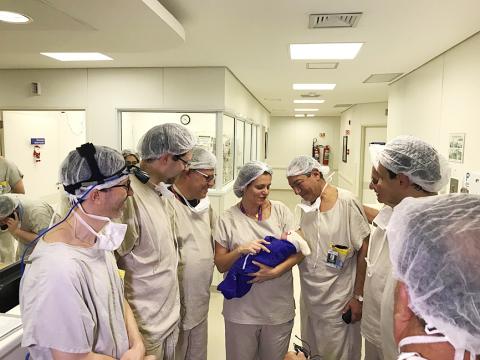A woman in Brazil who received a womb transplanted from a deceased donor has given birth to a baby girl in the first successful case of its kind, doctors said.
The case, published in The Lancet medical journal, involved connecting veins from the donor uterus with the recipient’s veins, as well as linking arteries, ligaments and vaginal canals.
It came after 10 previously known cases of uterus transplants from deceased donors — in the US, the Czech Republic and Turkey — failed to produce a live birth.

Photo: Reuters / Hospital das Clinicas da FMUSP
The baby girl was delivered via caesarean section at 35 weeks and three days, and weighed 2,550g, the case study said.
Dani Ejzenberg, a doctor at Sao Paulo University hospital who led the research, said the transplant — carried out in September 2016 when the recipient was 32 — shows the technique is feasible and could offer women with uterine infertility access to a larger pool of potential donors.
The norm for receiving a womb transplant is that the organ would come from a live family member willing to donate it.
“The numbers of people willing and committed to donate organs upon their own deaths are far larger than those of live donors, offering a much wider potential donor population,” Ejzenberg said in a statement.
However, the outcomes and effects of womb donations from live and deceased donors have yet to be compared, she said, adding that the technique could still be refined and optimized.
The first baby born after a live donor womb transplant was in Sweden in 2013. Scientists have so far reported 39 procedures of this kind, resulting in 11 live births.
Experts estimate that infertility affects about 10 to 15 percent of couples of reproductive age worldwide. Of this group, about 1 in 500 women have uterine problems.
Before uterus transplants, the only options to have a child were adoption or surrogacy.
In the Brazilian case, the recipient had been born without a uterus due to a condition called Mayer-Rokitansky-Kuster-Hauser syndrome. The donor was 45 and died of a stroke.
Five months after the transplant, the uterus showed no signs of rejection, ultrasound scans were normal and the recipient was having regular menstruation, Ejzenberg’s team wrote.
The woman’s previously fertilized and frozen eggs were implanted after seven months, and 10 days later she was confirmed pregnant.
At seven months and 20 days, the baby girl was continuing to breastfeed and weighed 7.2kg.

A new online voting system aimed at boosting turnout among the Philippines’ millions of overseas workers ahead of Monday’s mid-term elections has been marked by confusion and fears of disenfranchisement. Thousands of overseas Filipino workers have already cast their ballots in the race dominated by a bitter feud between President Ferdinand Marcos Jr and his impeached vice president, Sara Duterte. While official turnout figures are not yet publicly available, data from the Philippine Commission on Elections (COMELEC) showed that at least 134,000 of the 1.22 million registered overseas voters have signed up for the new online system, which opened on April 13. However,

EUROPEAN FUTURE? Albanian Prime Minister Edi Rama says only he could secure EU membership, but challenges remain in dealing with corruption and a brain drain Albanian Prime Minister Edi Rama seeks to win an unprecedented fourth term, pledging to finally take the country into the EU and turn it into a hot tourist destination with some help from the Trump family. The artist-turned-politician has been pitching Albania as a trendy coastal destination, which has helped to drive up tourism arrivals to a record 11 million last year. US President Donald Trump’s son-in-law, Jared Kushner, also joined in the rush, pledging to invest US$1.4 billion to turn a largely deserted island into a luxurious getaway. Rama is expected to win another term after yesterday’s vote. The vote would

ALLIES: Calling Putin his ‘old friend,’ Xi said Beijing stood alongside Russia ‘in the face of the international counter-current of unilateralism and hegemonic bullying’ Chinese President Xi Jinping (習近平) yesterday was in Moscow for a state visit ahead of the Kremlin’s grand Victory Day celebrations, as Ukraine accused Russia’s army of launching air strikes just hours into a supposed truce. More than 20 foreign leaders were in Russia to attend a vast military parade today marking 80 years since the defeat of Nazi Germany in World War II, taking place three years into Russia’s offensive in Ukraine. Putin ordered troops into Ukraine in February 2022 and has marshaled the memory of Soviet victory against Nazi Germany to justify his campaign and rally society behind the offensive,

Myanmar’s junta chief met Chinese President Xi Jinping (習近平) for the first time since seizing power, state media reported yesterday, the highest-level meeting with a key ally for the internationally sanctioned military leader. Senior General Min Aung Hlaing led a military coup in 2021, overthrowing Myanmar’s brief experiment with democracy and plunging the nation into civil war. In the four years since, his armed forces have battled dozens of ethnic armed groups and rebel militias — some with close links to China — opposed to its rule. The conflict has seen Min Aung Hlaing draw condemnation from rights groups and pursued by the